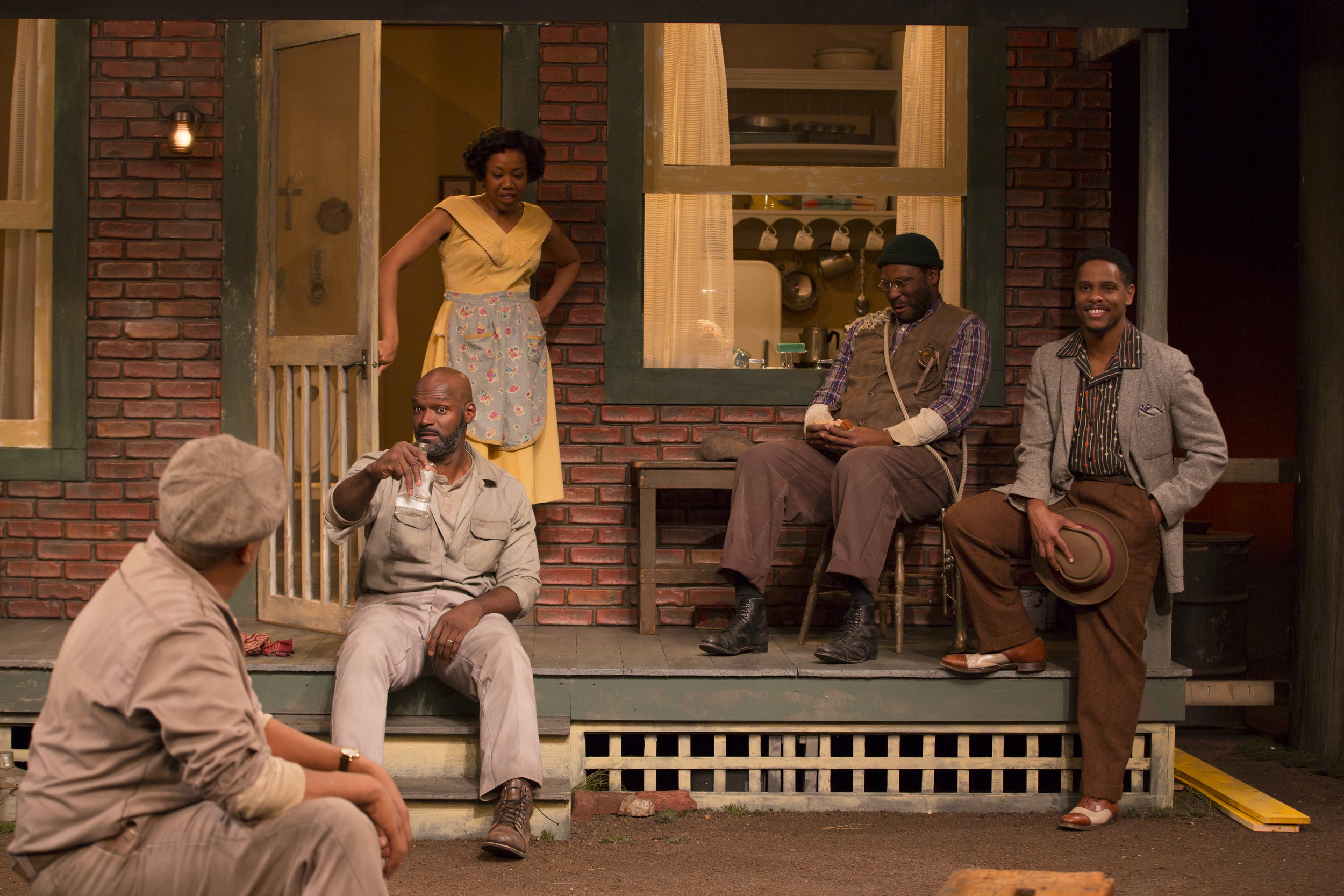Review of A Midsummer Night’s Dream, Hartford Stage
Shakespeare’s A Midsummer Night’s Dream has much to delight. With three stories that dovetail into one, the play offers at the heart of each story comic elements that have kept audiences entertained for generations. In one story, four Athenian youths—Hermia (Jenny Leona), Lysander (Tom Pecinka), Demetrius (Damian Jermaine Thompson), Helena (Fedna Laure Jacquet)—are caught up in a love triangle, overruled by Hermia’s father Egeus (Robert Hannon Davis) in a dispute brought to the attention of King Theseus (Esau Pritchett). Meanwhile in the forest, the fairy rulers Oberon (Pritchett) and Titania (Scarlett Strallen) are sparring over who should get custody of a changeling child. And a troupe of Athenian workmen, rehearsing in the forest, are putting together a play for the nuptials of Theseus and his bride Hippolyta (Strallen). Mistaken identity, love potions, metamorphosis, fits of jealousy, and ham-fisted theatrics combine to make the play a celebration of the different worlds theater can manifest.
Last year at Hartford Stage, director Darko Tresnjak gave us a silly, effervescent Comedy of Errors and seems determined to do the same with Midsummer. The problem, though, is that the latter play doesn’t lend itself as well to over-the-top hamming. That doesn’t mean the game cast doesn’t do all it can to provide belly laughs at almost every turn, but somewhere amidst all the preening and posturing, the pointing hands and waving arms, the crotch-grabbing and air-humping, the lampoons of American method actors by a showboat Bottom (John Lavelle) and the gauche ardors of lovers in school uniforms, a wise, witty, and sumptuously lyrical text goes missing.
The cast of A Midsummer Night's Dream, Hartford Stage (photos: T. Charles Erickson)
That might not matter to everyone, and there is method in the director’s decision to rein in the set while unleashing the actors. This strategy gives us an English country estate, particularly its gatehouse, for Athens, complete with an ordered park as environs. When Lysander and Hermia, supposedly at large in the wilds, lie a little further off amidst trim hedges and park benches, something seems awry. It’s that kind of disjunction that may keep a viewer waiting for a moment when something like the playwright’s vision might occur. One supposes it’s to be found in an obscene prop that accompanies Brent Bateman’s eager turn as Snout as Wall.
Titania (Scarlett Strallen), Oberon (Esau Pritchett)
Theseus, as everyone knows, is kind of a killjoy. Here, I found myself taking his side. It helps that Esau Pritchett gives the king much dignity, though he doesn’t seem much different when he becomes Oberon, but for his very becoming tunic. As Hippolyta, Scarlett Strallen looks good in a riding habit, with dark hair, and as Titania, she’s a begowned blonde who has the intonation to make the verse, and sometimes song as well, come alive. Her doting upon the “translated” Bottom is quite the set-piece it’s meant to be and the attendant fairy-maids (Melody Atkinson, Gabrielle Filloux, Anne O’Sullivan, Madison Vice) may be commended for actually downplaying what are often flamboyant parts, though the notion of an otherworldly fairy realm is lessened to nothingness. The lack of feyness in the fairy world is compounded by Will Apicella’s vigorous Puck, the least beguiling version I’ve ever seen.
Titania (Scarlett Strallen), above, Bottom (John Lavelle), below
One imagines the lovers would fare better if differently presented. In their school uniforms, they look immature and, suitably, act petulant rather than passionate. That tone, once established, helps to make their plight comic from the first, and then it’s just a matter of who will run farthest with it. I would single out Fedna Laure Jacquet for highest praise—as Helena, petulance suits her, and since she’s able to fawn like a dog and coquette like an awkward doll, she inspires the most laughter. Tom Pecinka’s Lysander and Damian Jermaine Thompson’s Demetrius get in some fun as boyish rivals à la “Our Gang,” while Jenny Leona makes Hermia’s turn at jealousy very vivid.
Helena (Fedna Laure Jacquet), Demetrius (Damian Jermaine Thompson)
Vivid too are those mechanicals, with John Lavelle as a Bottom whose well of mugging and vocal mannerisms hath no bottom, abetted by Matthew Macca as a lollipop-licking Flute. The point of the play within a play seems to be to show that, once upon a stage, a player will strut for all he can.
left to right: Flute (Matthew Macca), Starveling (Alexander Sovronsky), Bottom (John Lavelle), Snout (Brent Bateman), Snug (Louis Tuccci), Peter Quince (Robert Hannon Davis)
The critic G. K. Chesterton is quoted in the playbill as proclaiming that “the supreme literary merit of A Midsummer Night’s Dream is a merit of design.” By “design,” he means of course what we would mean by structure, the way the different worlds of the play impinge on one another to create a world in which magic—whether of love, fairies, or inspired clods—triumphs. Hartford Stage’s production gets demerits for design, as an unusually static take on this fluid play. Its failings help to show how much a play may be the creature of its appearance. The supreme merit this production aims for, and sometimes hits, is a merit of display.
A Midsummer Night’s Dream
By William Shakespeare
Directed by Darko Tresnjak
Scenic Design: Alexander Dodge; Costume Design: Joshua Pearson; Lighting Design: York Kennedy; Sound Design: Broken Chord; Projection Design: Lucas Clopton & Darron Alley; Wig Design: Jodi Stone; Composer & Music Director: Alexander Sovronsky; Dramaturg: Elizabeth Williamson; Fight Choreographer: Thomas Schall; Voice & Text Coach: Claudia Hill-Sparks; Casting: Laura Stanczyk, CSA; Production Manager: Bryan T. Holcombe; General Manager: Emily Van Scoy; Associate Artistic Director: Elizabeth Williamson
Cast: Will Apicella, Melody Atkinson, Brent Bateman, Robert Hannon Davis, Gabrielle Filloux, Fedna Laure Jacquet, John Lavelle, Jenny Leona, Matthew Macca, Anne O’Sullivan, Tom Pecinka, Esau Pritchett, Alexander Sovronsky, Scarlett Strallen, Damian Jermaine Thompson, Louis Tucci, Madison Vice
Hartford Stage
September 7-October 8, 2017







